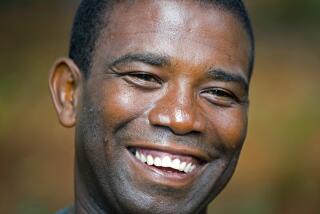Ex-Emperor Bokassa Goes Home to Immediate Arrest
- Share via
PARIS — Jean Bedel Bokassa, the ousted brutal emperor of the Central African Republic, returned to his homeland today from exile in France and was immediately arrested, an official there said.
Bokassa, 65, was overthrown in a French-backed coup in 1979 and sentenced to death in absentia on charges of murder and cannibalism.
A spokesman for French Premier Jacques Chirac, Denis Baudouin, said the former ruler, his wife and five of his 55 children secretly left their 18-room chateau west of Paris on Wednesday.
Arrested Upon Arrival
An official in the office of President Andre Kolingba of the Central African Republic confirmed Bokassa was arrested upon arrival this morning in the capital, Bangui.
The official said he had no further information and refused to give his name.
Baudouin said there were minor disturbances in Bangui when Bokassa arrived but did not elaborate.
Agence France-Presse quoted French government sources as saying Bokassa’s wife and children were not allowed to enter the country with him.
Baudouin told reporters that Bokassa and his family drove to Brussels on Wednesday, flew to Rome and took an Air Afrique flight to Bangui.
The spokesman said that although Bokassa was not under arrest in France, “one would have preferred to know certain things before he left.” He did not elaborate.
Took Power in Coup
Bokassa, a former French army soldier, took power in a 1965 military coup and became president. In 1976, he crowned himself emperor in a $10-million ceremony and changed the name of his country, where the average citizen earned $160 a year, from the Central African Republic to the Central African Empire.
Witnesses claimed that he clubbed to death schoolchildren whose parents refused to buy uniforms from a factory he owned, and there were allegations of ritualistic cannibal meals at his palace. He vehemently denied both stories.
He spent four years in exile in the Ivory Coast, then moved to his French chateau. He often said he was living only on a small military pension and sometimes ran out of money to heat the chateau or buy food for his family.
Bokassa repeatedly said he wanted to go back to the Central African Republic. A year ago, he alleged that President Francois Mitterrand of France “ordered that I be shot at if I show up in Bangui.”
Sentenced to Death
Earlier this year, Kolingba said in a French radio interview that Bokassa had been sentenced to death for “murder, embezzling state funds, illegal use of (state) property, assault and battery, receiving corpses, and cannibalism, to mention only that.”
He said if Bokassa returned, the law required that he be tried again. He said that this could cause disorder and that it was in Bokassa’s interest as well “to stay where he is calmly.”
In leaving France, Bokassa left a letter dated Oct. 11 and addressed to Mitterrand and Chirac, saying he wanted to return to his country, Baudouin said.
He expressed affection for France, which he called his second homeland, but said he was at the service of his own country “without a spirit of revenge.” He named two lawyers to defend his interests.
More to Read
Sign up for Essential California
The most important California stories and recommendations in your inbox every morning.
You may occasionally receive promotional content from the Los Angeles Times.













